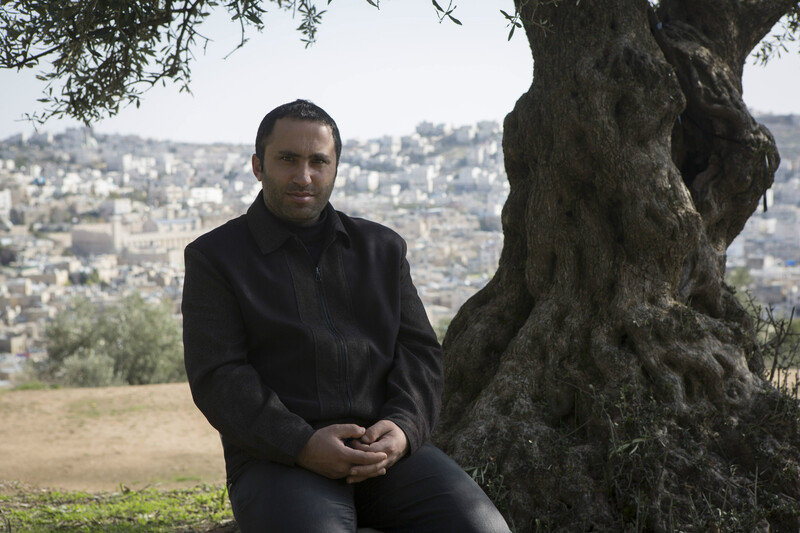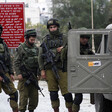The Electronic Intifada Ramallah 13 March 2015

Hebron activist Issa Amro
ActiveStillsOnce a thriving marketplace, Hebron’s Shuhada street has been closed to Palestinians for the past twenty-one years.
Israel used the 1994 massacre at the nearby Ibrahimi Mosque — during which the extremist American settler Baruch Goldstein killed 29 worshippers — as a pretext to tighten its control over the occupied West Bank city.
Today, Jewish-only settlements have surrounded Hebron and taken over parts of the city. These settlements are illegal under international law.
The closure of Shuhada Street is vigorously opposed by Palestinians. The organization Youth Against Settlements (YAS) both documents human rights abuses carried out by the Israeli military and takes direct action against Hebron’s suffocation.
In a symbolically important move, the group has succeeded in setting up a kindergarten on Shuhada Street.
Doing such work is highly risky. Youth Against Settlements has repeatedly found itself attacked by Israeli settlers and the military. Last month, for example, some of its activists were fired upon by residents of the Jewish-only settlement Karmei Tzur.
Issa Amro is a founder of Youth Against Settlements. He spoke to Narjas Zatat.
Narjas Zatat: What are the main aims of Youth Against Settlements?
Issa Amro: The main aim is to oppose the Israeli policies that displace the Palestinians from their homes in Hebron and to strengthen the morale of the Palestinian people in Hebron. We also want to empower Palestinian youths with the skills and support [needed] to resist the Israeli occupation, principally by advocating nonviolent resistance.
NZ: One of your projects is the Open Shuhada Street campaign. Could you tell me a little bit about the campaign and how it was conceived?
IA: Since 25 February 1994 — the date of the Ibrahimi Mosque massacre — Shuhada street has been closed to Palestinians.
In 2009, Youth Against Settlements led a delegation from the anti-apartheid movement in South Africa through Shuhada Street. The Israeli army and the settlers attacked us.
After this ordeal, we agreed to coordinate a global day of action to call for the reopening of Shuhada Street for Palestinians. In 2010, we had our first global day [of action]. We asked all of our friends from all over the world to organize nonviolent activities — in their cities, organizations and universities — in solidarity with Hebron. Over time, it came to be known as the international day of solidarity with Hebron.
We held many activities for Palestinian youths. One of the things we did was to train young people to use video cameras so that they can document human rights violations and we succeeded in increasing awareness of the situation in Hebron through the use of these cameras.
We use social media as a tool to reach a wider audience. We organize tours and home stays for international visitors who are visiting Hebron in order to learn more about Palestinian life in the city.
We have volunteering days where we organize trips in order to help Palestinian families to remain in their homes. We deliberately choose houses in a “hotspot” — houses that are near settlements or military bases or areas that are somehow closed off from the rest of the Palestinian [community]. We clean each house, we clean the yard, we dig the land, paint, put up fences and tidy up the mess left by soldiers who often enter these houses as part of their intimidation tactics.
We have managed to create a kindergarten on Shuhada Street. It is the only public space created in the restricted part of Hebron in the last twenty years.
NZ: Why is the Open Shuhada Street campaign so important?
IA: Because the main goal of the Ibrahimi Mosque massacre was to kill the Palestinian identity in Hebron. The main aim of the settlers in Hebron is to confiscate Shuhada Street and the area surrounding it. They want to connect the settlements inside the city with Kiryat Arba, which is a settlement [on the outskirts of] Hebron.
They [the Israeli military] have closed Shuhada Street and confiscated over 520 Palestinian-owned shops. It is the main street in Hebron which connects all of the parts of Hebron together — north, south, east and west. It is the city center.
All the main markets are either on Shuhada Street or around it, and the same goes for holy sites. Small Palestinian businesses that specialize in handmade products are also based around Shuhada Street.
NZ: Youth Against Settlements has enjoyed a number of small victories. Can you summarize those victories and explain their impact?
IA: We have stopped the expansion of the Tel Rumeida settlement to the east. Settlers were [according to Israeli law] illegally occupying one of the houses. In one of the rare occasions where the law worked in our favor, we managed to take it back.
We are now using the house as the center for Youth Against Settlement activities. Our presence there has halted the further expansion of the settlement, although the settlers continue to try and take it.
Another victory is that we have defended Palestinian land between Kiryat Arba and the neighboring settlement Givat Haavot. The Israeli settlers thought they had acquired the land, but we managed to get it back and allow the original Palestinian owner of the land to once more farm on it.
The kindergarten we created had been an empty house that settlers had tried to move into illegally. However, we have consistently protected that building despite the fact that Israeli soldiers have forcibly removed us from the premises sixteen times.
Israeli settlers attacked us more than 35 times. We had to smuggle in the construction materials during the night in order to refurbish the house. We would walk one kilometer, sometimes more, to buy the construction materials and carry them on our shoulders to the home.
NZ: I understand that your office was raided on 26 February. What happened?
IA: The Israeli soldiers surrounded the house, and they came in to search for the materials we use for protests. It was a preemptive move to stop the protest that was scheduled for the following day. They wanted to confiscate the speakers, the banners, the flags that were made. Luckily, they found nothing.
We have had previous experience with these types of raids and we took all the materials to another house the night before they came. Luckily, nobody was hurt. They were looking for specific people who were leaders in the protest and in the community in order to arrest them. However, we were prepared for this as well, and told the relevant people to stay away from the office until the day of the protest.
NZ: Do these kind of arbitrary raids happen often?
IA: These raids happens usually before a big event. For example, there were problems when Youth Against Settlements filmed the incident with David Nahlawi [an Israeli soldier, whose real name is David Adamov, aiming his rifle at young Palestinians]. The footage was on every social media outlet all over the world.
As a result, soldiers came to the house and threatened us with arrests in order to warn us from filming them in the future. From time to time, Israeli soldiers come to warn activists from filming, protesting peacefully or talking to internationals about the situation in Hebron.
NZ: On 6 February, Israeli settlers living in the Hebron area opened fire on a group of Palestinian activists. Is this kind of violence commonplace?
IA: Yes, yes it is. We have been attacked many times by settlers. They usually threaten us with guns.
They do not want any kind of popular resistance or peaceful protests against the illegal settlements — particularly in Hebron.
Narjas Zartat has completed a masters’ degree in Japanese studies and international relations. She is currently undertaking an internship in Palestine. Twitter: @NtheodoraK


